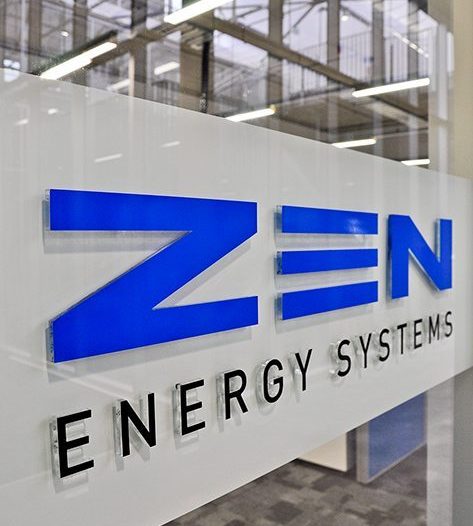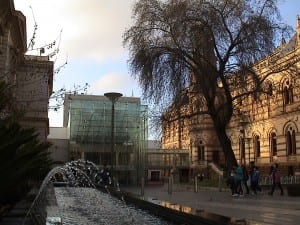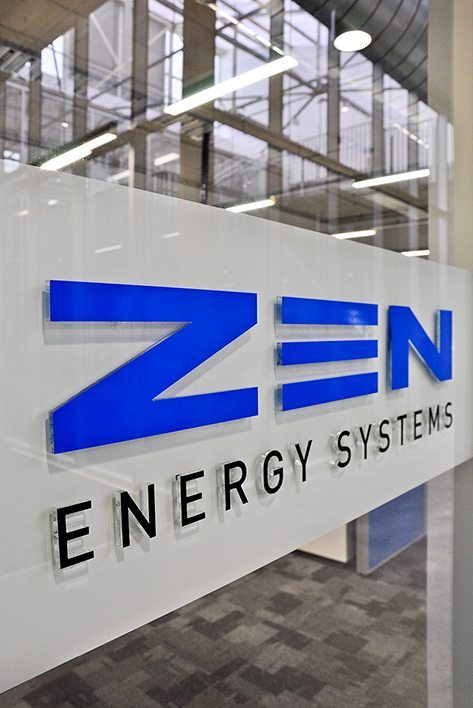
In what is believed to be an Australian first, three battery storage systems totaling 512kWh of capacity will be installed at government-owned buildings in Adelaide by local solar and storage specialist, ZEN Energy.
South Australia energy minister Tom Koutsantonis said in a statement on Monday that Adelaide-based company ZEN Energy had won the $1 million tender to install lithium-ion batteries at three sites around the city: the State Library of South Australia, the Art Gallery of South Australia and Adelaide High School.

Koutsantonis said the sites had been identified as priority projects, offering the greatest potential for high energy cost savings through reducing demand.
For ZEN Energy, the project will contribute to the development of its manufacturing centre at Tonsley Park innovation hun in Adealide, which is designing, manufacturing, factory testing and maintaining ZEN Freedom Powerbank battery systems, pictured below.
As we reported here, ZEN’s reincarnation as Australia’s first dedicated community renewable energy provider, with Ross Garnuat as chairman, was officially launched at Tonsley last October.

It was born out of ZEN Technologies, a decade-old solar and storage company, after founder Richard Turner recognised an opportunity to provide Australian consumers with an option to use 100 per cent renewable energy to power their homes, businesses or entire communities, at a cost cheaper than electricity from the grid.
ZEN also has a share in US energy storage company Greensmith – and Greensmith, in turn, has a share in ZEN Energy – which currently claims a massive one-third of the US energy storage market, including credits for installing the world’s largest energy storage system, at 20MWh.
This, said Turner in October, meant ZEN was “12 months or two years ahead of Tesla, with technology as advanced as Tesla’s, and price competitive with the grid. And …Australian manufactured.”
South Australia, meanwhile, has an ambitious climate strategy, that includes its joint commitment with Adelaide City Council to make Adelaide the world’s first carbon neutral city, and to achieve a 30 per cent improvement in the energy efficiency of government buildings by 2020.
According to Koutsantonis, government-owned and leased buildings contribute more than 15 per cent of overall greenhouse gas emissions in the Adelaide City area.
“Battery storage of renewable energy offers the possibility of capturing that power as it is generated and delivering cheap power around the clock, so advances in the technology are a very exciting proposition for South Australia,” Koutsantonis said.
“This nation-leading initiative will demonstrate how battery storage can play a role in reducing the carbon footprint of large buildings and save governments money over time.”
According to ZEN’s Turner, this particular project will showcase battery’s storage’s key role in managing the total electricity costs of commercial businesses, either stand alone or complemented with solar.
“This is the first demonstration of the significance of energy storage in commercial businesses in Australia,” Turner told RenewEconomy by email on Monday. “It will demonstrate through integrated software a combination of peak shaving and energy arbitrage and significantly reduce the cost of demand charges and energy for these sites.”
The Adelaide City Council is reportedly also contracting ZEN Energy, separately, to install a similar battery storage system at their council works depot.
“Battery storage has transformed the renewable energy sector and opened up a whole new range of possibilities,” said Adelaide Lord Mayor Martine Hesse.
“The project will demonstrate how this technology can be used and encourage private building owners to establish similar systems, so they too can reap the benefits of low-cost, low-carbon energy.”

Sophie is editor of One Step Off The Grid and deputy editor of its sister site, Renew Economy. Sophie has been writing about clean energy for more than a decade.

